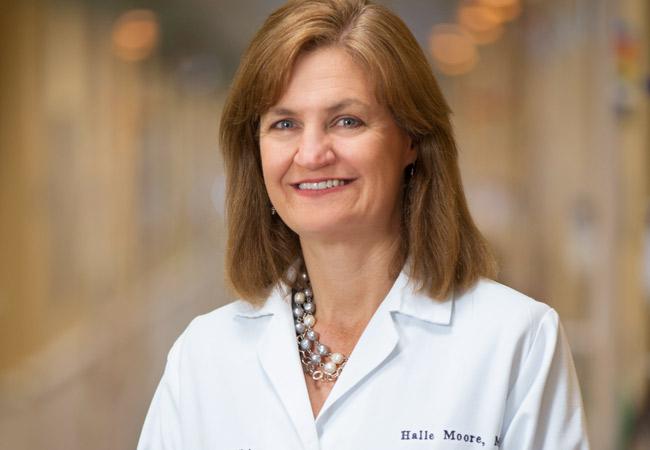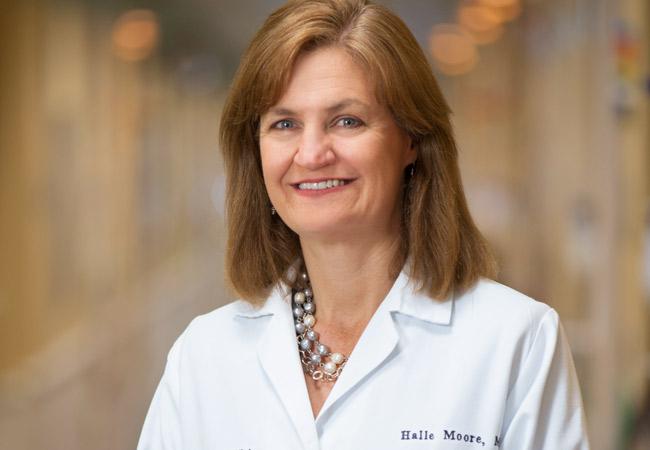
Credit: Cleveland Clinic
Final results of SWOG Cancer Research Network's groundbreaking international Prevention of Early Menopause Study (POEMS) clinical trial are in, and they show continued evidence that women who get injections of the hormone drug goserelin along with standard breast cancer chemotherapy are more likely to become pregnant – without developing negative side effects or shortening their lives.
"These five-year follow-up results confirm our initial findings," said SWOG investigator Halle Moore, MD, lead researcher on the POEMS study and associate professor of medicine at Cleveland Clinic. "Goserelin protects the ovaries from the effects of chemotherapy, reducing the risk for early menopause. By getting these injections, more women became pregnant without negatively affecting their health or their chances of surviving their cancer."
The results are published in the current issue of the Journal of the National Cancer Institute. When the POEMS team announced initial study results at the 2014 American Society for Clinical Oncology (ASCO) annual meeting, they gained international attention. POEMS is a unique collaboration, managed by SWOG, one of five groups in the National Cancer Institute's National Clinical Trials Network (NCTN), with help from two other NCTN groups – ECOG-ACRIN Cancer Research Group and the Alliance for Clinical Trials in Oncology. The International Breast Cancer Study Group, which includes the Australia New Zealand Breast Cancer Trials Group, provided trial access to patients around the world.
The randomized, phase III trial also got attention for focusing not on the effectiveness of a cancer treatment, but the impact that treatment has on the lives of cancer survivors. In the United States, almost 49,000 women under the age of 50 are diagnosed each year with invasive breast cancer. Hormone-receptor negative breast cancer is a less common type, which doesn't feed on estrogen or progesterone, and doesn't typically respond to drugs that target these hormones.
Ovarian failure is one side effect of chemotherapy, one that carries a heavy burden for women, including infertility, sexual dysfunction, and unpleasant symptoms. To determine if ovarian failure could be prevented, the POEMS team launched their trial. Between 2004 and 2011, investigators randomized 218 premenopausal women with hormone-receptor negative breast cancer, placing them into two study groups. One group received standard chemotherapy treatment, and the other received standard chemotherapy plus goserelin.
Initial results showed that 22 percent of patients on standard therapy experienced ovarian failure while only 8 percent who received goserelin did. In addition, those 2014 results also showed that 12 percent of patients on the standard arm got pregnant, while 22 percent who received goserelin did.
The new results, which include five years of follow-up, show similar effects. On average, 23 percent of women who took goserelin became pregnant compared with 12 percent on the standard therapy. Importantly, women who took goserelin experienced similar, or even better, survival rates compared with women who received standard chemo. Five years after treatment, 88 percent of women who took goserelin were alive and disease-free compared with 79 percent of women who got standard chemo. While differences in survival were not statistically significant, 92 percent of women who took goserelin were alive at five years compared to 83 percent of control patients.
When the POEMS results were first issued, SWOG senior investigator Kathy Albain, MD, FACP, FASCO, of the Cardinal Bernardin Cancer Center of Loyola University Chicago, predicted they'd change the standard of care for breast cancer. And they have. The National Comprehensive Cancer Network Clinical Practice Guidelines for Oncology and the St. Gallen Consensus Conference guidelines already reflect the use of goserelin for younger women who hope to protect ovarian function during chemotherapy for breast cancer.
"Cancer researchers set out to change the standard of care in order to improve, or lengthen, people's lives," Moore said. "Our final results show a means to improve quality of life for young women with hormone-receptor negative breast cancer. If they want to be mothers, they can improve their chances safely and effectively. I'm proud of this result, and our international team."
###
Along with Moore and Albain, the SWOG study team includes Joseph Unger, PhD, of the SWOG Statistics and Data Management Center at Fred Hutchinson Cancer Research Center; Kelly-Anne Phillips, MD, of the University of Melbourne; Francis Boyle, MBBS, PhD, of the University of Sydney; Erika Hitre, MD, of the National Institute of Oncology in Budapest, Hungary; Anna Moseley, MS, of the SWOG Statistics and Data Management Center at Fred Hutch; David J. Porter, MD, Auckland Regional Cancer and Blood Service; Prudence A. Francis, MD, of the University of Melbourne; Lori J. Goldstein, MD, of Fox Chase Cancer Center; Henry L. Gomez, MD, Instituto Nacionale de Enfermedades Neoplasticas; Ann H. Partridge, MD, of Dana Farber Cancer Institute; Shaker K. Dakhil, MD, of Louisiana State University Health Sciences Center; and Agustin Garcia, MD, of Louisiana State University Health Sciences Center.
The National Institutes of Health funded the study through National Cancer Institute grant awards CA189974, CA180888 and CA180819. The Australia and New Zealand Breast Cancer Trials Group, the Breast Cancer Institute of Australia, and AstraZeneca also supported the trial.
SWOG Cancer Research Network was founded in 1956, and is a member of the National Cancer Institute's National Clinical Trials Network and the NCI Community Oncology Research Program, making it part of the oldest and largest publicly funded cancer research network in the United States. SWOG has over 12,000 members in 47 states and six countries who design and conduct cancer prevention and treatment trials. SWOG trials have led to the approval of 14 cancer drugs, changed more than 100 standards of cancer care, and saved more than 3 million years of human life. Learn more at swog.org
Media Contact
Wendy Lawton
[email protected]
503-348-8675
@SWOG
http://swog.org
Original Source
https://www.swog.org/news-events/news/2018/10/29/hormone-injections-reduce-early-menopause





